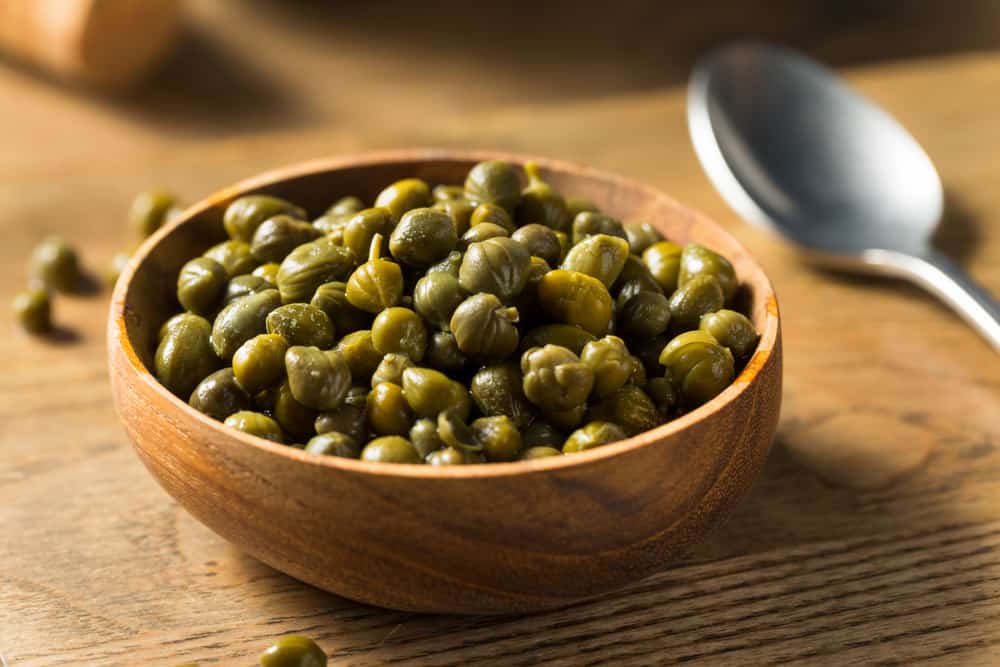Last Updated on 22nd April 2022 by
Capers are essential in several different dishes, and this Mediterranean food is often sold in jars next to the pickles and olives in the grocery store. But what are capers?
What’s sold in the grocery store comes from a prickly plant called the caparis spinosa. The green flower buds from that plant are taken un-ripened and dried out and then preserved. Usually, they’ll be pickled in a brine mixture or cured using salt.
What Do Capers Taste Like?
The brining and pickling process for capers makes them salty and slightly tart. They’re very similar in flavor profile to olives and pickles since they’re preserved and packaged in a similar way.
There’s a slightly bitter taste to them, and it’s a flavor that’s sometimes been described as a floral tartness. They have a tangy taste similar to that of lemons or limes, but lacking that citrusy freshness.
If you’ve never used capers before, hopefully this description of their flavors gives you some idea of how you might want to use them and how they can be incorporated into a dish.
Capers themselves don’t have a lot of flavor, and a lot of the flavoring is due to how this food is packaged. If you were to get raw capers rather than canned, pickled capers, the taste would be distinctly different and subtler.
Where Do Capers Come from?
Capers grow naturally throughout Asia and the Mediterranean, which would include Cyprus, Greece, and other nearby countries. That’s why they’re often used in Mediterranean dishes like chicken piccata.
They’re picked before they’re ripe to help them retain their distinctive flavor, and they help add a little jolt of flavor to whatever they are incorporated into.
What Are Capers Used for?
You can use capers as a garnish or condiment in a number of dishes, and they’re often included in potato salad, macaroni salad, salad dressings, and a number of sauces.
They are often a vital component in a variety of very thick sauces, like marinades or tapenades. Their distinctive texture or flavor helps to stand out in the sauce, giving it a little more character and making it more complex.
They help add a little texture and flavor to a large variety of foods. If you’ve not used them before, it’s best to follow a recipe when incorporating capers. That way, you know they’re recommended to be included in the dish. Until you get comfortable using them and you understand how they’re often used, you probably won’t want to just add them on your own to spice up a dish.
Capers are often included in a large variety of pasta dishes, as well as in seafood. They may be added to shrimp, scallops, whitefish, fish filets, and many other fish dishes.
How to Use Capers
My best advice for using capers in food is to use them sparingly. They have a strong, potent flavor, and if you use them too much, you will overpower your other food and the flavor. Capers are very useful, but only when used in small quantities at once.
In fact, capers can be so potent that a lot of recipes will call for you to rinse them off before using them. That gets rid of a lot of the packaging flavors that are added, like the salt in the brine when they’re pickled or salted.
Pay close attention to how recipes call for you to use capers. You may need to slice them, rinse them, flavor them, or use some other preparation method so that they are more appropriate for what you’re cooking.
What Are Capers Good for?
They are excellent for spicing up dishes with a little extra flavor, giving your food a little pop and accentuating some of the flavors that are already there. They can’t do that if you use too much of them at once, though.
Capers can be used in a lot of the same dishes you might use olives in.
In fact, olives are the best substitute for capers, if you don’t have any available. Capers are ideal for giving your food a little more punch, adding a touch of potent flavor, when they are used sparingly.
While many recipes call for capers, they can be added to recipes that don’t include them, once you have a feel for what they do and how they can be incorporated into different foods. If you want to punch up a rather bland dish, capers can be a good way to do that.
How do you Store Capers?
Generally, you won’t use an entire jar of capers in a single recipe. You’ll probably have some left over, so you’ll want to know how to store them for later use. When capers are not stored properly, they can start to discolor or emit foul odors.
If that happens, it’s time to toss them out. Any signs that the capers may not taste right or smell right should be considered an indication that it’s time to get rid of them.
In order to store your capers properly, they should be kept in salt or brine. Generally, they’ll come packed in one of these already, and it’s best to continue keeping them with the same storage method for best results.
If they’re packed in a brine in a jar, make sure that the capers are submerged in liquid. They can be kept in the fridge in an airtight container this way for about nine months or so. If they’ve not been opened, however, they can be kept in the pantry at room temperature.
If capers are packaged in salt, they can be kept at room temperature and should store for as long as six months.
For a lot of people, capers are very unfamiliar food, and they’re not sure how to use them. Once you try to few recipes with capers and paid close attention to the flavor that they add, you’ll start to better understand them and be able to use them more freely and regularly.
I'm Pauline, a mother of four grown children, my passion for cooking stemmed from the joy i get cooking for my family. I love to try new dishes, especially when dining out but creating and sharing my own recipes is my favourite thing to do!



binance konto skapande
Thursday 22nd of May 2025
Your point of view caught my eye and was very interesting. Thanks. I have a question for you.
打开Binance账户
Tuesday 8th of April 2025
Thank you for your sharing. I am worried that I lack creative ideas. It is your article that makes me full of hope. Thank you. But, I have a question, can you help me?
sucklers
Friday 21st of February 2025
t7QiIHkhSLj
Aristocracy
Friday 21st of February 2025
SNke9FZW3Kl
Daftar di Binance
Friday 31st of January 2025
I don't think the title of your article matches the content lol. Just kidding, mainly because I had some doubts after reading the article.